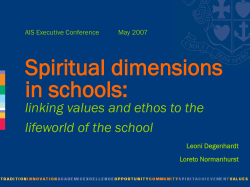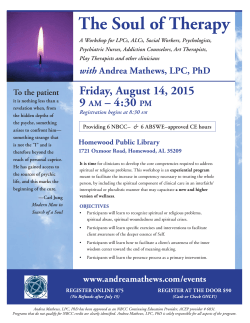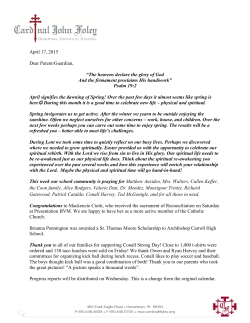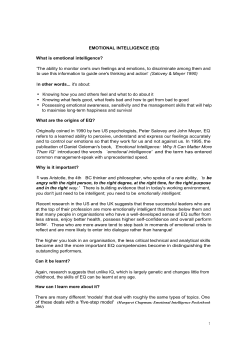
Investigation the Impact of Paint Therapy on Communication Skills of
International Journal of Psychology and Behavioral Research. Vol., 4(1), 015-019, 2015 Available online at http:// www. ijpbrjournal.com ISSN 2322-4002 ©2015 Victor Quest Publications Investigation of the spiritual intelligence effectiveness on married women's marital life satisfaction 1 2 Sima Basravi , Ali Mohammad Nazary , Ablolrahim Kasayi 3 1- AM family counseling, University of Kharami, Tehran campus, Tehran 2- Associate professor, University of Kharami, Tehran 3- Assistant professor, University of Kharami, Tehran Corresponding author: simabasravy@yahoo.com Abstract The aim of this study was investigation of the spiritual intelligence effectiveness on marital life satisfaction of married women living in Karaj city. the statistical population comprised of all married women living in Karaj city. 30 married women, selected via simple sampling method, constituted the sample. To gather data, ''Perceived Marital Relationship Quality Component '' and the spiritual intelligence training protocol were used. Univariate covariance analysis was applied to analyze the data. The results of this study showed that spiritual intelligence training protocol could be effective in improvement of marital life quality and its components including intimacy, sexual excitement, love and trust. In other words, spiritual intelligence enhances the married women's lives quality. Spiritual Intelligence Training with emphasis on different communication patterns, discovering false interactions, expanding acceptance experience, facilitating expressed needs of couples and understanding the divine presence, scholarly behavior and selfless love, leads to improvement of love, trust, intimacy and marital life quality. Keywords: spiritual intelligence, marital life quality, married women Introduction In recent years, interest in spiritual issues in the field of psychology and psychoanalysis has been increased (Unterrainer, Huber, Sorgo, Collicutt and Fink, 2011). Researches show that beliefs, cultural components and spiritual commitments intercommunicate with positive outcomes such as psychological and physical health, marital satisfaction, interpersonal functioning and high quality of the marital life (Seybold & Hill, 2001; Hosaini, Elias, Eric Krauspiritual & Aishah, 2010). Some psychologists have defined spirituality as the permanent efforts of human beings to answer the life ''why''s. spiritual intelligence can be considered as one of the applicable aspects of spirituality concept. The concept of spiritual intelligence was introduced for the first time by Stevens in 1996 (Vaughan, 2005) and further developed by Immons in 1999. Vaughan believes that spiritual intelligence includes the individual's potential ability to perceive the meaning of life and his existence identity that in it, constructs of intelligence and spirituality are combined in a new construct. In spiritual intelligence, spirituality means seeking holiness, knowledge and meaning, while intelligence signifies applying these concepts for adjustment and improving the level of human being's welfare (King, 2008). Amram (2005) defines spiritual intelligence ad a set of abilities to use values and spiritual features in order to increase the action and welfare of daily life. Spirituality affects all aspects of the individual's life including familial relations. Family is basically the center of help, healing, and relief; this center should reduce the pressure imposed on its members and provide them with opportunities to grow and evolve. If family becomes a healthy and constructive environment for its members and fulfills their psychological as well as physical needs, its demand to health institutes outside the family lessens (James and Variation, 2015). Marital life quality is one of the factors that predict the health of a family. Intl. J. Phys. Beh. Res. Vol., 4(1), 105-109, 2015 Life quality can be recounted as the outcome of mutual interaction between individuals' personalities and linkage of life events, influencing the set of fields that form the life (James and Variation, 2015). World Health Organization (2011) describes life quality as the individuals' comprehension of their positions in their lives, according to their cultural context and environmental value systems, in relation to their goals, criteria and interests. Many terms has been utilized to describe the quality of marital life, such as adaptability, satisfaction, happiness, integrity and commitment, intimacy and trust (Dalgleish et al, 2014). Marital life quality means internal evaluation of couples' relations in some dimensions and values; it refers to a scope of values that includes a spectrum reflecting extensive characteristics of marital function and interaction (Tabrizi, 2006). In a meta-analysis, Sawatzk, Ratner and Chiu (2005) studied the relationship between spirituality and marital life quality. In the final analysis, these scholars mentioned spirituality as a discrete concept related to marital life quality (Sawatzk et al, 2005). Also, Zullig, Ward and Horn (2006) declared that according to pervious research, spirituality had a positive effect on life quality. Findings of King's (2009) study revealed a negative relation between spiritual intelligence and depression, aggression, enmity and anxiety, and a positive relation between this concept and mood traits, social sensitivity, life satisfaction, and activity. Generally, it can be said that those with higher spiritual intelligence are more likely to use adaptive problem solving skills and profit from spiritual resources to solve their daily life problems. They bestow meaning and value to their daily affairs and can better cope with difficulties, therefore, they experience higher levels of marital life satisfaction. Given what said before, the question being probed in this study is whether training spiritual intelligence can enhance marital life quality. Method The present study is semi-experimental with pre/post-test and a control group. The statistical population consisted of all couples living in Karaj city in 2014. The sample included 30 married women selected via simple sampling method. To perform the research, first, married women in Karaj city were invited to participate in sessions of training spiritual intelligence. After notification and registration, 30 married women were selected randomly. The aim of study was explained and written consent. ''Perceived Marital Relationship Quality Component Questionnaire'' was performed to gather the pretest data. The participants were randomly put in the experimental and control groups. Members of the experimental group took part in 8 sessions of training spiritual intelligence, holding once a week, each session for 120 minutes. At the end, the same questionnaire was performed as the post-test. The data were analyzed by univariate covariance analysis, so, normal distribution of them was previously investigated through Clomot Geruf Smirnov test. Perceived Marital Relationship Quality Components Questionnaire: this scale, developed by Feltcher, Simpson and Tomas (2000), has 18 items answered on a 7-rate Likert range (1=never, 7=entirely). Its 6 subscales include satisfaction, commitment, intimacy, trust, sexual excitement, and love components. Cronbach's alpha for the subscales in this study was reported 0.91, 0.96, 0.86, 0.78, 0.78, 0.86, 0.89 respectively, while its total Cronbach's alpha was obtained 0.85. In Iran, Niloofarforooshan (2001) translated this questionnaire, and its content validity was confirmed by several professors of Psychology and Counseling Group of Isfahan University. The scholar reported its total Cronbach's alpha as 0.95. Also, this coefficient by gender separation was calculated 0.95 for women and 0.94 for men. In the study of Khaje and Bahrami, Fatehi zadeh and Abedi (2000) the internal consistency was determined by Chronbach's alpha, and this coefficient for the subscale as mentioned above was computed 0.92, 0.84, 0.92, 0.94, 0.91, and 0.89, respectively. Training Spiritual Intelligence Protocol: this protocol included 8 sessions of training spiritual intelligence. The summary of its sessions is presented below. Session 1: presentation. Objective: mutual presentation between the scholar and participants, performing the pre-test Session 2: Consciousness. Objective: enhancing participants' awareness and self-consciousness (consciousness toward self and one's own-self) Session 3: Goodness and grace. Objective: to live in a manner consistent with the clergy and the experience of love and trust in life. Session 4: internal orientation. Method: conversation, evaluation, and analysis of the former session 106 Intl. J. Phys. Beh. Res. Vol., 4(1), 105-109, 2015 Home works to reach the strength and effective points of assigned home works, performing it in the couple relations and giving feedback to the participants Session 5: meaning and concept. Objective: Achieving meaning in every moment of life, regardless of external circumstances Session 6: Existence and character. Objective: improving the participants' insights and the experience of peace and inner tranquillity Session 7: Truth and honesty. Objective: The experience of a life accompanied by relaxation, acceptance, openness and trust Session 8: integrity and wholeness. Moving beyond the individual self to an interconnected and transcendental whole, creating a relationship based on the inner heartfelt sympathy and orientation with their fellow Result After performing the main analyses, a primary analysis was done to gain introductory insights on the data. In this section, first, demographic and second, descriptive findings will be presented. Table 1: the mean and standard deviation of the experimental and control groups Group N M SD Relationship Quality Experimental 30 16.13 4.23 Control 30 11.76 2.20 Intimacy Trust Experimental Control Experimental Control 30 30 30 30 15.40 11.43 15.63 11.73 4.45 1.79 4.31 1.99 As it is observed in Table 1, the highest and lowest standard deviation belongs to Intimacy (4.45) and Relationship Quality (4.23) components of the experimental and control groups, respectively. In addition, the highest mean is accrued to Relationship Quality component in the experimental group (16.13), while the lowest one is computed for Intimacy component in the control group (15.40). Table 2: the results of covariance analysis for the effect of training spiritual intelligence on marital life quality, intimacy, sexual excitement and love Source of Sum of Fd Mean of F Significance Eta changes squares Square level Square Marital life 247558.59 1 247558.59 1785.02 0.000 0.25 Quality Effect Pre-test 34912.86 25 1396/51 10.07 0.01 0.18 effect Error 554.50 4 138.62 Total 304889 30 Intimacy 5057.66 1 5057.66 213.81 0.000 0.25 Effect Pre-test 1146.90 13 88.22 3.73 0.007 0.18 effect Error 378.46 16 23.65 Total 8487.00 30 Trust 6348.12 1 6348.12 0.000 0.25 effect Pre-test 1054.48 12 577.46 0.000 0.18 effect Error 186.88 17 7.99 Total 9343.00 30 According to Table 2, after controlling the effect of pre-test (p<0/01), marital life quality (p<0/01((, intimacy (p<0/01) and trust (p<0/0000) remained significant. In other words, training spiritual intelligence protocol as an intervening program had been successful in improving marital life quality, intimacy, and trust in the experimental group. 107 Intl. J. Phys. Beh. Res. Vol., 4(1), 105-109, 2015 Conclusion The findings of the present study revealed that training spiritual intelligence could improve marital life quality. This finding is alike those of Alex et al (2011), Hosaini, Elias, Eric Krauspiritual and Aishah (2010), King (2008). Given previous studies, it can be said that spiritual life, by its dependence on an inner core reflecting the individual's view toward the world and surrounding, has a significant role in predicting life satisfaction and marital life quality. Dudley and Kosinkki (1990) as well as Rabinson and Blanton (1993) have also confirmed this outcome. Zaher and Marchal (2001) believe that individuals with high levels of spiritual intelligence are flexible and highly conscious to themselves. In addition, they are highly able to face difficulties and solve daily life problems and more satisfied with marital life. As emerged in this study, spiritual intelligence and marital life quality were positively correlated. Women use spiritual intelligence as a way to solve problems more, and therefore, this concept can explain the quality of their marital lives. So, those who profit higher levels of spiritual intelligence probably apply adoptive problemsolving skills more and give meaning and value to their daily tasks, and use spiritual sources to cope with their lives difficulties. On the other hand, behaviors such as forgiveness, sacrifice, dedication, self-control and granting sanctity to daily affairs are more chromatic in these people's lives; hence, it probably gives them more strength to oppugn with hard situations and make cordiality in their live and hereupon, they will be merrier with their marital lives. Additionally, the results of this research acknowledged the effectiveness of training spiritual intelligence on improvement of marital intimacy. This finding was formerly supported by the studies of Stevens (2000), Nygren (2005), Sawatzky, Ratner and Chiu (2005), Zuling, Ward and Horn (2006), and Erick Krauspirituala and Aishah (2010). In explanation of this hypothesis it can be assumed that spiritual intelligence in general includes a kind of compatibility entailing the highest developmental levels of cognitive, emotional, moral, and interpersonal aspects that assists the individual to achieve unison with his/her surrounding phenomena and acceding internal as well as external integration. This intelligence bestow the person an overall view on the life and its all events and experiences, and enables him to reframe and reinterpret his experience while deepening his recognition and knowledge. Active integration of spirituality in daily life and adoptive usage of abilities, values, and related resources, manifests the expression of spiritual intelligence (Vaughan, 2000). For instance, Spiritual intelligence can be applied to identify and understand the patterns of thought, goals and beliefs that form the foundation of our and others' behaviors (Vaughan, 2000). Spiritual intelligence is related to goal setting in life, capacitates the individual to free himself from any kinds of disgust and abhorrence toward others, and gives him the ability of discrimination and moral wellness. This intelligence also makes him flexible against rules and be creative in the face of limitations. Spiritual intelligence aids couple to think of rational-practical solutions instead of deepening their conflicts that in its turn, leads to feeling more intimacy. Another finding of this study was that training spiritual intelligence can positively affect the marital trust. Nygren (2005), Alex et al (2011), and Sahebalzamani et al (2013) also came to the same conclusion. Spirituality is in connection with the transcendent existence, belief in the invisible, and the development of human beings through the maze of life and adjusting the personal life based on the interaction with this transcendent existence and perceiving its Permanente attendance in a divine meaningful, organized and oriented essence. This aspect of human's existence is indigenous and evolves through the religion rituals and practices. Spiritual intelligence helps us to find solutions based on the state, meaning and value of problems. This intelligence enables us make our activities meaningful and evaluate our performances. It also aids us to perceive which of our acts and behaviors are more valid and which direction in our lives is more perfect and transcendental to be selected as the life pattern. Trusting the almighty divinity helps couples to relay on a secure support and have more trust on their mates, and to eliminate their affective problems by trusting each other. Singh and Sinha (2013) investigated the impact of spiritual intelligence on life quality. The findings indicated that those receiving training of spiritual intelligence, compared to the control group, had higher levels of life quality and felt more intimacy with their spouses. This increase in the level of life quality was significant in long-term. This study had some limitations that should be mentioned. First, it was performed on only one gender (women). Second, the training duration was short (2 months) and without follow up to control the effect of training on obtained results. Additionally, some demographic features (social-culturaleconomic statutes, and studies) of the participants were not specified since they did not accept to unfold them, although having this information could enhance the findings validity. Hereupon, it is suggested that future researches be performed on both genders to increase findings validity and their generalization to the whole society. The other offer is to administer fallow up after the training protocol 108 Intl. J. Phys. Beh. Res. Vol., 4(1), 105-109, 2015 performance with the aim of assessing the results reliability. Obtaining complete demographic information in order to monitor the training effect and enhance the findings validity is also proposed. References Hands B, Larkin D. 2006. Physical fitness differences in children with and without motor learning difficulties. European J SPEC EDUC. 21, 447–456. Amram J. 2005. Intelligence Geyond IQ: the contribution of emotional and spiritual intelligence to effective business leadership ,Institune of Trans per sonal psychology. Alex M, et al. 2011. Marital happiness as the function of spiritual intelligence. International Multidisciplinary Research journal, v 1(9), p. 6-7. Dalgleish T L, Johnson S M, Burgess M M, Wiebe S A, Tasca G A. 2014. Predicting Key Change Events in Emotionally Focused Couple Therapy. Journal of Marital and Family Therapy; doi: 10.1111/jmft.12101. [Epub ahead of print] Dudley MG, Kosinkki F A. 1990. Religiosity and marital satisfaction: A research note.Fam Relations. 32(1): 78-86 . Hosaini M, Elias H, Eric Krauss S, Aishah S. 2010. A Review Study on Spiritual Intelligence, Adolescence and Spiritual Intelligence, Factors that May Contribute to Individual Differences in Spiritual Intelligence, and the Related Theories. International Journal of Psychological Studies. 21:179-188. James S L. 2015. Variation in trajectories of women's marital quality. Journal of Social Science Research. 49:16-30. King D B. 2008. Rethinking claims of spiritual intelligence: A definition, model, and measure. Applications of Modeling in the Natural and Social Sciences Program (Dissertation). Ontario: Trent University. Mellors M P. 1999. self-transcendence, and quality of life. Dissertation Abstracts International: Section B: The Sciences and Engineering. 60: 1533. Nygren B, Ale’x E, Jonse’n Y, Gustafson A, Norberg A, Lundman B. 2005. Resilience, sense of coherence, purpose in life and self-transcendence in relation to perceived physical and mental health among the oldest old. Aging & Mental Health. 9: 354–62. Nasel D D. 2004. Spiritual orientation in relation to spiritual intelligence: A Consideration of traditional Christianity an new Age individualist spirituality; unpublished the sis. Australia: the university of south Australia. Rabinson L C, Blanton P W. 1993. Marital strengths in enduring marriages. Fam Relations. ; 42: 333-45. Seybold K S, Hill P C. 2001. The role of religion and spirituality in mental and physical health. Current Directions in Psychological Science. 10:21-24. Sawatzky R, Ratner P A, Chiu L. 2005. A meta-analysis of the relationship between spirituality and quality of life. Social Indicators Research. 72:153-188. Stevens D D. 2000. Spirituality self-transcendence and depression in young adults with AIDS. Dissertation Abstracts International: Section B: The Sciences and Engineering. 61:78. Sahebalzamani M, Farahani H, Abasi R, Talebi M. 2013. The relationship between spiritual intelligence with psychological well-being and purpose in life of nurses. Iran Journal of Nursing and Midwifery Research. 18 (1): 38-41. Singh M N, Sinha J. 2013. Impact of Spiritual Intelligence on Quality of Life. International Journal of Scientific and Research Publications. 3 (5): 1-5. Unterrainer H F, Huber H P, Sorgo I M, Collicutt J, Fink A. 2011. Dimensions of religious/spiritual wellbeing and schizotypal personality. Personality and Individual Differences. 51:360-364. WHO. 2011. Global atlas on cardiovascular disease prevention and control, policies, strategies and interventions. Vaughan F. 2002. What is spiritual intelligence? Journal of Humanistic Psychology. 42:16-33. Zullig K J, Ward R M, Horn T. 2006. The association between perceived spirituality, religiosity, and life satisfaction: The mediating role of self-rated health. Social Indicators Research. 79:255-274. 109
© Copyright 2025









